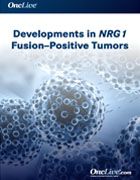Dr. Tolba on the Use of Afatinib in NRG1-Mutated in Lung Adenocarcinoma
Khaled A. Tolba, MD, MBBCh, discusses the use of afatinib in NRG1 fusion–positive lung adenocarcinoma.
Khaled A. Tolba, MD, MBBCh, assistant professor of medicine, School of Medicine, Oregon Health & Science University, discusses the use of afatinib (Gilotrif) in NRG1 fusion—positive lung adenocarcinoma.
The TAPUR study is an umbrella trial aimed at matching patients with specific gene mutations, chromosomal transformations or driver mutations with personalized treatment, explains Tolba.
Recently, afatinib has been added to the TAPUR trial for use in NRG1-mutant lung cancer because it appears there is activity with this treatment, says Tolba. This is particularly important because there are no FDA-approved therapies for this disease,nor any targeted agents for patients with NGR1 fusions.
Pan-ERBB TKIs like afatinib are aimed downstream by targeting ERBB3 and ERBB4. The hope is to target the active ligand and ultimately benefit this particular patient population.




